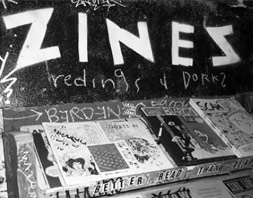DIY isn't dead

DIY stands for Do It Yourself. DIY as a subculture began with the punk movement of the 1970s, when bands began recording their own albums, making their own merchandise and booking their own tours. This created opportunities for smaller bands to get more recognition and gain cult status through low-cost DIY touring.
The DIY ethic benefits the supplier and the consumer because it enables people to sell more, do more and bring more to the table, which in turn produces more product — new and interesting things for people to try, more availability, unique finds and lower costs.
Today, it's an option that is available to everyone and something that is looked upon as empowering, inspiring and admirable. There are many different ways to get your name out there as entrepreneur.
Other than the musical aspects of the DIY scene, there are many literature aspects that have become increasingly popular in recent years.
Self-published books are a common way to get noticed and gain notoriety, as well as alternative comics, graphic novels, even art and poetry collections. The organization and production of these elements soon merged into a collaboration of all aspects of art and thus the zine was born.
Zines are, of course, short for magazines, though they differ slightly in the level of professionalism or focus on overall aesthetic. A way for individuals to sort their likes and opinions, zines work as a sort of pamphlet for teaching others about various different things; anything from music to movies to cooking, art, photography, poetry, even tutorials for getting involved with local events and organizations, such as an Anarchist zine or a zine promoting a city's local vegan scene.
Known as the youth culture's gateway to DIY culture, zines keep the movement alive by providing tutorials for how to make your own products and why it's important to support others as well.
When looking into your own DIY ethic and where to start, you should always focus on your specific tastes. Is there something about yourself that is unique? Do you have something to offer that isn't widely prevalent in your town, and you think there's a want or need for it (or at least a few interested spectators)? Make a list of things you like, things you're good at and materials you might like to work with in order to come up with ideas for your own DIY adventures. Then come up with ideas about where to start and what is going to be involved in the production, for example, the costs and supplies you might need, where to sell and whom to target.
Channeling inspiration can be a great way to find your niche, and there are many places to search for ideas to inspire; however, make sure you know the difference between borrowing ideas and blatantly copying someone. It's hard to come up with "original" ideas since most things have all been done before (and possibly in ways bigger and better than you can accomplish), but don't let that discourage you. Put your own spin on things and don't try too hard to please others when working on your projects. Remember that DIY ethics are largely based on the personal appeal and rewards reaped from having something unique and special.
Some examples of things you can get started with include but are not limited to: knitting, sewing, making handmade jewelry, ceramics, recycled garment production, mix tapes, poetry, photography and art.
I myself enjoy working with fashion and clothes, and have in the past made my own garments by the use of studding, cutting, ripping, painting, embellishing and jewelling clothes. I also adore working with feathers and other crafty materials, creating pieces that are unique to me and stand out.
If you are really good at doing something, you never know who out there might appreciate it so help keep DIY culture alive and start your own personal brand.













